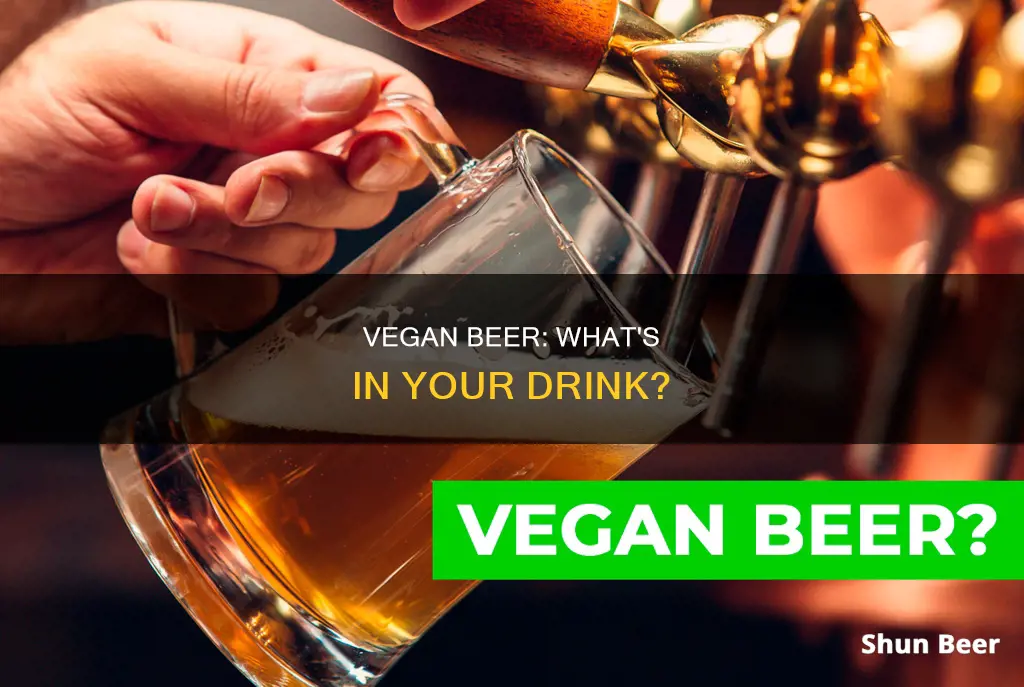
Beer is typically made from barley malt, water, hops and yeast, which are all vegan ingredients. However, some brewers add finings, or clarifying agents, that are not vegan, such as isinglass (derived from fish bladders), gelatine (from animal bones and skin), glycerine (sometimes made from animal fats) and casein (a milk product). These ingredients are used to remove impurities and create a clearer, brighter beer, but they render the final product non-vegan. It can be difficult to tell which beers are vegan because manufacturers are not required to list ingredients on their labels. However, resources like Barnivore list thousands of vegan-friendly alcoholic drinks, and some beers, like Budweiser and Guinness, are widely known to be vegan.
| Characteristics | Values |
|---|---|
| Can vegans drink beer? | Yes, usually. |
| What makes a beer non-vegan? | Non-vegan additives like lactose, honey, or isinglass (a clarifying agent derived from fish swim bladders). |
| How to identify non-vegan beer? | Check the Barnivore database, which lists over 44,000 vegan-friendly alcoholic drinks. |
| Examples of vegan beers | Blue Moon Belgian White, Sierra Nevada Celebration Ale, Budweiser, Coors, Guinness, Heineken, Miller Lite, and many more. |
What You'll Learn

Beers that are suitable for vegans
Most beers are vegan, but some contain animal products. It's always best to check before buying a beer whether it contains non-vegan ingredients.
Non-vegan beer ingredients include:
- Isinglass (derived from the swim bladders of fish)
- Gelatin (made from boiling the skin, tendons, ligaments, and bones of animals)
- Glycerin (often derived from animal fats)
- Casein (a milk product)
- Egg whites
- Honey
Some beer styles that often contain non-vegan ingredients include:
- Milk stouts
- Honey beers
- Cask ales
- Meads
However, there are plenty of vegan beers available, and many popular brands are vegan-friendly. Here are some examples of beers that are suitable for vegans:
Pale Ales and IPAs
- Sierra Nevada Pale Ale and Hazy Little Thing
- Bear Republic: Racer 5
- Lagunitas IPA
- Harpoon IPA
Stouts and Porters
- Guinness Extra Stout (most varieties are vegan)
- Sierra Nevada Porter and Stout
- Deschutes Obsidian Stout
- Samuel Smith Oatmeal Stout
- Goose Island Oatmeal Stout
- Speedway Stout by the AleAmith Brewing Company
Lagers
- Sapporo, Kirin, or Asahi lagers
- Sam Adams Boston Lager
- Pabst Blue Ribbon
- Labatt Blue
- Pilsner Urquell
- Modelo Especial
- Corona
- Modelo Negra
- Modelo Light
- Stella Artois (not the Cidre)
- Grolsch Premium Pilsner
- Heineken (most varieties are vegan)
- Ice Draft Light
- Carlsberg
- Budweiser
- Bud Light
- Yuengling
- Michelob Light
- Coors
- Coors Light
Other Beers
- All Sam Smith’s beers except Yorkshire Stingo and Old Brewery Bitter
- Boddingtons (cans, bottles and keg)
- Carlsberg Light
- Budweiser and Bud Light Lime-a-Rita
- Sam Adams Summer Ale, Black Lager, and OctoberFest
- Yuengling
- Grupo Modelo beers, including Modelo Negra, Modelo Especial, and Modelo Light
- Goose Island beers, including IPAs, APAs, Belgian-style ales, lagers, and seasonal brews
You can also use online resources like Barnivore to check if a beer is vegan.
Riders, Beer and Uber: What's the Deal?
You may want to see also

Beers that are not suitable for vegans
While beer is primarily made using vegan ingredients, some brewers add finings or clarifying agents that are obtained by killing or exploiting animals. These non-vegan finings are used to remove impurities and give the beer a clearer appearance.
Milk Stouts
Beers categorised as milk stouts typically contain lactose or whey. However, some manufacturers have started making vegan versions of milk stouts by using non-animal-based ingredients.
Honey Beers
The use of honey immediately disqualifies a drink from being vegan. Brewers sometimes use honey instead of sugar to sweeten their beers, so be sure to check the ingredients list.
Cask Ales
Cask ales are among the beer styles that use common finings agents such as isinglass. The addition of any of these clarifying agents makes a beer non-vegan unless a vegan agent has been used instead.
Meads
Mead is a traditional beer-like drink made through the fermentation of honey, making it a non-vegan drink.
Non-Vegan Finings
When checking the ingredients list, look out for the following non-vegan finings:
- Isinglass: Harvested from the swim bladder of fish and dried in the sun before being added to the beer.
- Gelatin: Derived from boiling the skin, tendons, and bones of animals. It is often added during fermentation or directly into the beer keg.
- Glycerin: Can be made from plant oil or animal fats. Many ingredient labels do not specify which form of glycerin is used, so it is best to avoid this ingredient if you are unsure.
- Casein: A milk-based ingredient sometimes used in the fining process for beer and wine. Many people have a casein allergy, so manufacturers usually indicate its presence on the bottle.
In addition to these non-vegan finings, other animal-based ingredients to look out for include egg whites, milk, and honey.
Beer Traps: Effective Earwig Control or Urban Myth?
You may want to see also

How to identify if a beer is vegan-friendly
Most beers are vegan, but some use non-vegan finings in their brewing process. These are the ingredients that might be added to beer to make it non-vegan-friendly:
- Albumin—a protein obtained from animal fluids and tissues and used as a foaming agent.
- Bone char—comes from burned animal bones and is used to filter the beer.
- Carmine—a crimson dye derived from cochineal insects; found in red and pink ales.
- Casein—a milk protein that clarifies the liquid.
- Chitin/Chitosan—fining agents generated mostly from the exoskeletons of lobsters, crabs, and shrimps, but they can also come from fungus.
- Gelatin—a fining agent that comes from animal body parts and is also used as a clarifying agent.
- Glycerol monostearate—a foaming agent commonly generated from animal fats but can also come from plants.
- Honey—an animal-derived component occasionally added to flavour beer, increase its alcohol content, or as the base for mead.
- Isinglass—collagen formed from the dried swim bladders of fish, used to make the beer appear clearer and brighter.
- Lactose—brewers can use it to sweeten and thicken the mouthfeel of the beer; it's most common in "milk" or "cream" stouts.
- Whey—a dairy flavouring additive with a unique flavour and creamy texture.
Some beers are not labelled as vegan even if they are. This is because, while brewers might not have used animal ingredients in the recipe, the filtration and fining processes may leave residues of animal products in the beer.
- Check the brewer's website. As veganism grows in popularity, it is becoming easier to find this information. Many breweries, particularly larger ones, will generally avoid using animal ingredients.
- Check the beer bottle or pump clip. Although it's not a legal requirement to list isinglass as an ingredient on beer labels, it's likely that a beer made using vegan-friendly methods will say so on the packaging.
- Use Barnivore.com, a vast database that tracks vegan beers across the globe.
Beer and Eliquis: A Safe Mix?
You may want to see also

The process of beer clarification
Beer is commonly made from barley malt, water, hops, and yeast, and is therefore usually vegan. However, some brewers add finings that are not vegan, and this means that some beers are not suitable for those trying to live a cruelty-free lifestyle.
Beer clarification is a key process in beer production, ensuring the product has the expected taste, stability, brilliance, haze, and shelf life.
There are several methods to clarify beer, including mechanical filtration, fining agents, and modern crossflow membrane filtration.
Mechanical Filtration
Commercial breweries often use mechanical filtration to "brighten" their beer. This method involves using a wort chiller to quickly cool the wort, causing undesirable tannins and proteins to clump and fall out.
Fining Agents
Fining agents are added to remove impurities and create a clear, bright, crisp appearance. These agents attach themselves to proteins, yeast, and tannins, making them heavier so they fall out of suspension and settle at the bottom of the fermenter or bottle. Common fining agents include isinglass, gelatin, and glycerin, which are derived from animal products, and are therefore not vegan. However, there are vegan fining agents available, such as Biofine, which is made from Silicic Acid and SiO2.
Crossflow Membrane Filtration
The latest technology in beer filtration and clarification is the use of crossflow membrane systems, which provide a sustainable process that maintains the beer's characteristics from keg to keg and bottle to bottle. This method combines the advantages of centrifugation and crossflow membrane filtration, resulting in high operational safety and low operation costs.
Checking for Vegan Beers
It can be challenging to determine if a beer is vegan due to the lack of legal requirements for brewers to list ingredients. However, resources like Barnivore and PETA provide lists of vegan beers, and ingredients to avoid.
STD Shots and Beer: What's Safe?
You may want to see also

The rise in demand for vegan beers
The demand for vegan beers is on the rise, with more and more people adopting a vegan lifestyle and seeking out plant-based options that align with their values. This trend has prompted breweries to re-evaluate their brewing processes and ingredients to cater to this growing market.
While the core ingredients of beer—malted barley, yeast, hops, and water—are plant-based, certain additives and processing aids derived from animal products can make a beer non-vegan.
One of the main reasons beers are not considered vegan-friendly is the use of animal-derived fining agents during the brewing process. Fining agents, such as isinglass (made from fish bladders), gelatin, or egg whites, are used to clarify and stabilize the beer, removing impurities and creating a clear, bright appearance. However, these agents contradict a vegan lifestyle, and their use has come under scrutiny as consumers demand more ethical and sustainable alternatives.
Additionally, some beers may contain non-vegan additives like lactose, which is added for flavour and body, or honey, which is used as a sweetener or to increase alcohol content.
The benefits of choosing vegan beer
The rise in demand for vegan beer has led to several advantages for beer enthusiasts:
- Ethical and sustainable practices: Vegan beers are produced without animal-derived ingredients or by-products, contributing to animal welfare and environmental sustainability.
- Health benefits: Vegan beers often have lower levels of sulfites, which can cause headaches and adverse reactions in some individuals. They are also often crafted from organic grains and brewed using natural methods, ensuring they are free from harmful pesticides and chemicals.
- Supporting ethical breweries: Choosing vegan beer means supporting breweries that share your values and are committed to ethical and sustainable practices.
- Diverse range of options: The increasing demand for vegan beer has encouraged breweries to innovate and create a diverse range of plant-based beer options, from robust IPAs to light lagers and rich stouts, ensuring that everyone can find a vegan beer that suits their taste preferences.
Identifying vegan beers
Identifying vegan beers can be challenging, as brewers often do not label or market their beers as vegan-friendly. However, resources like the Barnivore website and the BevVeg mobile app can help consumers find vegan beers by providing comprehensive directories of vegan-friendly beverages. Additionally, consumers can contact brewers directly to inquire about the use of animal ingredients in their brewing processes, reminding companies of the growing demand for vegan options.
Beer and Cataract Surgery: What You Should Know
You may want to see also
Frequently asked questions
Yes, vegans can drink beer, but not all beers are vegan-friendly. It's important to check the ingredients list and be aware of non-vegan ingredients to look out for.
Some beers contain animal-derived fining products like gelatin, isinglass (derived from fish bladders), glycerin (which can be derived from animal fats), casein (derived from milk), lactose, whey, and honey.
It can be tricky to determine if a beer is vegan, as manufacturers are not required to list ingredients on beer labels. Look for vegan symbols or allergen statements on the label, or check online resources like Barnivore, which lists vegan-friendly alcoholic drinks. You can also contact the manufacturer directly to inquire about the vegan status of their products.
Popular beers that are suitable for vegans include Budweiser, Coors, Carlsberg, and Guinness. Many craft beers are also vegan-friendly, and some breweries include a vegan trademark on their labels.
Cask ales, honey beers, and milk stouts often contain non-vegan ingredients and are not suitable for those following a vegan lifestyle.







